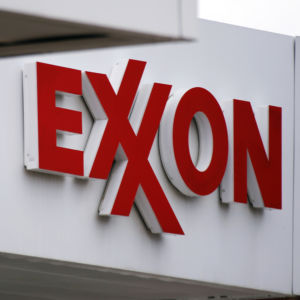Anti-Fossil Fuel Activists Issue Yet Another Dubious Study About Exxon
As their campaign against ExxonMobil stalls both in legal courts and the court of public opinion, green activists are attempting to restart the effort by promoting a study by two prominent professors. But no sooner was the study released than the debate became as much about the academic independence of the professors who wrote the study as it was about ExxonMobil itself.
In the paper, published in Environmental Research Letters, an academic journal, Geoffrey Supran, a postdoctoral fellow, and Professor Naomi Oreskes, both of the department of the history of science at Harvard University, analyzed the texts of documents covering a period between 1977 and 2014, which have been made publicly available by the company, specifically focusing on advertorials. Oreskes and Supran considered these advertorials to have particular weight because they functioned as a de facto lobbying campaign for the company and represented “an unequivocally public form of communication ‘designed to affect public opinion or official opinion.'”
“Available documents show a discrepancy between what ExxonMobil’s scientists and executives discussed about climate change privately and in academic circles and what it presented to the general public,” the researchers concluded.
The researchers claim that ExxonMobil acknowledged that man-made climate change was real in 83 percent of peer-reviewed papers and 80 percent of internal documents, while expressing doubt on the subject in 81 percent of its advertorials. They argue that this amounts to an attempt by the oil company to hide information about global warming from consumers.
However, tweets from the authors of the report show that they did not begin the study from a neutral perspective. Oreskes has long been involved in efforts to prosecute oil companies for climate change. She is on the board of the Climate Accountability Institute, the group that organized a 2012 conference in La Jolla that laid out the foundations of a strategy to link oil companies to climate change using a strategy similar to that employed to connect tobacco firms to lung cancer. The New York Times specifically credits Oreskes with the idea for the conference, which eventually sparked the #ExxonKnew campaign.
Last year, in a hearing on Capitol Hill, she admitted that she has also been in close contact with the attorneys general currently engaged in investigating ExxonMobil.
“I was invited about a year or so ago to New York to speak to the staff of the New York Attorney General’s office mostly about the work we did in Merchants of Doubt … And I also participated a few weeks ago in a meeting in Boston with some colleagues from the Union of Concerned Scientists, which also involved the staff of attorneys general offices from a number of states who came to listen to again factual presentations about climate science, history of climate disinformation,” she told Rep. Paul Tonko, D-N.Y., at the hearing.
Global warming has been a hot button issue in 2017. The new Trump administration has made domestic energy development a major focus and has rolled back regulations like the Clean Power Plan and the Paris Climate Accords that the Obama administration adopted to reduce carbon emissions. In addition, New York Attorney General Eric Schneiderman remains embroiled in a complex lawsuit against ExxonMobil while others have questioned the attorney general’s political motivations and coordination with outside groups and wealthy donors.
Indeed, Schneiderman’s investigation has dragged on for over two years. It not only has yet to produce charges, but he has abandoned the #ExxonKnew conspiracy advanced by Oreskes and Supran, who claim the company had covered up the effects of fossil fuel on the environment for decades. With the theory debunked and Schneiderman backing off his earlier statements, Oreskes and Supran returned to the drawing board to publish a new study. But as many questions surround this document as their previous work.
Prior to beginning the study, Oreskes and Supran made public comments condemning ExxonMobil for misleading information on climate change. In one 2015 tweet, Oreskes posted a link to a Salon story about then-presidential candidate Bernie Sanders calling for a federal probe into alleged climate science malfeasance. “Did Exxon deliberately mislead the public on climate change? Hello. Of course they did!” Oreskes wrote.
More recently, she publicly praised Massachusetts Attorney General Maura Healey for beginning a costly legal investigation into ExxonMobil’s statements on climate change.
Supran has a similar history in the climate movement. He was a member of the divestment movement, urging colleges and universities to pull their endowment investments out of oil and natural gas companies and tweeted about how it was a “sane” position to suggest that “Exxon’s actions may have imperiled all of humanity…It’s time to divest.” Last year, he also tweeted about how he hoped someone “engineers ExxonMobil out of business.”
From their backgrounds, it is clear that Supran and Oreskes both believed strongly in climate change and believed that oil companies were to some degree morally responsible. Their study seems to support these preconceptions.
Despite its being published in a peer reviewed journal, critics of the study have been quick to point out its inherent flaws. The studies written by ExxonMobil scientists that acknowledge the reality of climate change were published in academic journals and thus accessible to anyone with a subscription.
Even more significantly, the study fails to account for the corporate history of ExxonMobil. Prior to 1998, Exxon and Mobil were separate corporations. The researchers claimed that for forty years, the company acted like two corporations targeting two separate audiences; however, most of the advertorials studied by Oreskes and Supran were published by Mobil before the merger, while the internal documents primarily came from Exxon. They did not come to share a corporate strategy until later.
The paper produced stirring headlines, but in the end rests on analysis of a mere 187 documents in order to make claims about more than 40 years of corporate policies for two separate companies.

